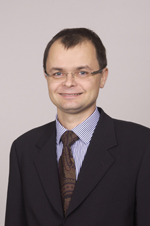Grzegorz Ira, Ph.D.
Department of Molecular & Human
Genetics

Dr. Ira received the award for his contributions to the study of mechanisms of DNA
recombination. DNA recombination is a fundamental cellular process essential for
life in higher eukaryotes. Homologous recombination is a driving force in evolution
by generating new combinations of alleles and repairing DNA gaps and chromosomal
breaks. This topic is at the center of modern understanding of genomic instability
which promotes cancer. It is now recognized that fundamental mechanisms of recombinatorial
repair are highly conserved across species, making studies such as that done in
yeast by Dr. Ira translatable to human.
Dr. Ira's laboratory identified enzymes that are responsible for the initial stage
of DNA recombination, the removal of one of the two DNA strands at a broken DNA
end. This forms single-stranded DNA (ssDNA) which is essential for DNA repair and
cell cycle checkpoint control. Previously, eukaryotic enzymes for this process were
unknown. Using a combination of genetics and high-resolution in-vivo biochemical
approaches, Dr. Ira's lab identified several enzymes with redundant activities that
form ssDNA at DNA breaks. The enzymes responsible for processing DNA ends have homologs
in humans and two of them were demonstrated to play a similar role in human cells.
Deficiency in the activity of these enzymes leads to dramatic human disorders such
as Nijmegen breakage syndrome, ataxia telangiectasia, and Bloom syndrome.
Identification of the enzymes responsible for generating ssDNA at DNA damage sites
opens the possibility of studying how cells regulate the choice of different DNA
repair pathways and why cells possess multiple redundant pathways to generate ssDNA.
Dr. Ira's nomination was based on the following publications:
Zhu Z, Chung WH, Shim EY, Lee SE, Ira G. Sgs1 helicase and two nucleases Dna2 and
Exo1 resect DNA double-strand break ends. Cell 2008 134(6): 981-94.
Commentary/review in:
Nature 2008 455:740-1.
Genes and Development 2008 22:2903-7.
Cell 2009 137:807-10.